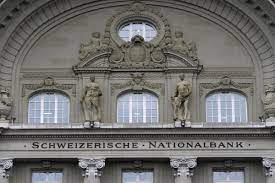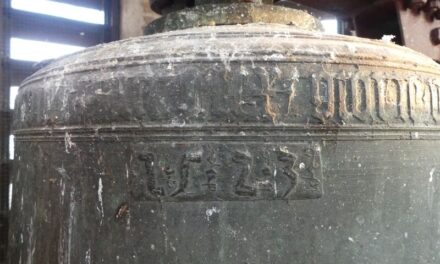The historian Zsuzsanna Borvendég's series was originally published on the PestiSrácok website, but there are certainly those who missed it. But those who haven't read all the parts should also read it again. Knowing the whole picture, can we understand how we got here?
In the previous section, you could have read that some Hungarian communists were definitely active in Switzerland from 1946, who not only managed the affairs of foreign trade to the West, but also helped covert financial operations through local banks. They cooperated in the transfer of funds that partly provided cover for illegal weapons purchases, but according to the CIA, there was plenty of it for the subversive activities of the Western fraternal parties. Until 1950, János Nyerges was the Swiss resident, now let's see who worked alongside him at that time!
Even in connection with the abuses of the West-Orient company, we mentioned that after its liquidation, the communists created several successor companies, into which they transferred the assets of West-Orient, which fell into embezzlement. One of them was the Eastern European Trade Co., whose head György Oblath . This company did not have a long life either, as the open takeover of power in the economy was approaching, and the first "impex" in the classical sense was born precisely with the transformation of this company in 1948. This was Kelimpex, which already had the main hallmarks of socialist foreign trade companies: it was a state-owned company and received monopolies for the exclusive distribution of the products of certain industrial sectors.
The impex empire was built from Kelimpex
In the evolution of the development of socialist-type foreign trade, the Kelimpex is somewhat reminiscent of the living creature that first left the primeval ocean and stepped out onto land to slowly populate the continents with its offspring. Since Kelimpex was the legal successor of the Eastern European Trade Company, which was created specifically as a party company, it is also legally possible to see how the communist hegemony over foreign trade was turned into a state - with some euphemism - state.
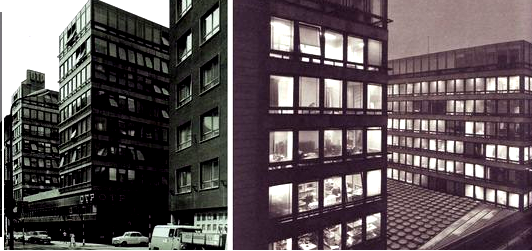
Chemolimpex headquarters (source: wikipedia/Zoltán Gulyás)
During 1949, Kelimpex was split into several companies, which was when Chemolimpex, Medimpex and Lignimpex were created. In other words, the construction of the impex empire was an organic continuation of the process that the Communist Party László Háy and Zoltán Vas started in the fall of 1944, during which foreign trade became a private interest of the Communists.
Comrade Gál made arrangements from Zurich
Kelimpex's scope of distribution included energy carriers - such as crude oil -, various chemicals, and in all probability also traded in technical goods. His operations were also monitored by US intelligence, as he conducted extensive business in Switzerland in the late 1940s. Its director is mentioned in CIA documents as Andreas L. Gal His secret account belonged to Gál Nyerges' network and was managed by the Schweizerische Bankgesellschaft in Zurich - at least according to the Americans.
In one of the American intelligence reports, it can be read that Gál was responsible for the procurement of weapons and military technologies on behalf of the Hungarian communist leadership, and made secret weapons purchases from his headquarters in Switzerland. The amount needed to carry out the tasks – according to the Americans, several hundred thousand dollars – was available in the mentioned secret account, but we do not know anything about the source of the money found here.
Andreas L. Gal is none other than Endre Lajos Gál , later CEO of Magyar Külkereskedelmi Bank. From 1950, Gál was the head of a department at the Ministry of Foreign Trade, and his name can be linked to several financial abuses that the state defense took into account, but were never held accountable for and his career remained unbroken.
Lajos Endre Gál, or the rise of an embezzler
Based on the CIA data, we can conclude that he did not carry out his frauds and embezzlements on his own account, but on behalf of him, which is why he was able to receive protection. Already in 1945, it was reported that he traveled to Czechoslovakia, where he stole 12,000 crowns and 14,000 pengas from a car driver. The crime was discovered and the party committee ordered Gál to pay back, which he complied with when the pengő was completely devalued - in other words, he fulfilled the sanction and didn't. As a ministry official , he "committed several acts that were of a sabotage nature," the state security wrote about him.
For example, it delayed certain shipments, for which the Hungarian party had to pay significant compensation to the customer, or it forced some foreign trade companies to meet demands made by foreign companies without the Hungarian party acknowledging their legitimacy. Using this method, he paid an Argentinian company more than half a million US dollars in 1952, but in several cases the state defense was notified that he had paid damages in the order of ten thousand dollars to Western companies under various false claims. With these actions, he obviously supported companies or "businessmen" at the expense of the Hungarian economy who had to be helped for political reasons - presumably on behalf of the Soviets, at least there is nothing in the Hungarian sources to indicate that the Hungarian party leadership or intelligence gave all these instructions.
He also defrauded the famous Omega watch factory
As we mentioned, his career steadily climbed upward, and in 1957-58 we find him again in Switzerland, as the head of the Hungarian trade office in Bern. The Kádár power also demanded his services, despite his corrupt and illegal dealings.
At that time, only 10 percent of the Omega watches purchased on behalf of Elektroimpex were delivered to Hungary, and the rest were sold in Switzerland and other western countries with the help of a Swiss dealer - bypassing Omega's trade network. In doing so, he not only damaged the Hungarian economy, but also harmed the interests of the watch factory, which severed its relationship with Elektroimpex as a sanction. Gál was able to conduct a number of similar deals, helping to finance the international communist movement - thanks to this, in 1960, he was appointed the first person of the Magyar Külkereskedelmi Bank.
In 1967, the Magyar Nemzeti Bank intended to set up a branch in Zurich, and Gál was chosen to head it - apparently because he was familiar with Swiss conditions, but unfortunately we do not have any further information about this planned financial institution.
The CIA considered György Oblath to be Gál's right-hand man
Gál mentions György Oblath of - one of the MKP's "money makers" - who was then in Switzerland representing Lignimpex as his right-hand man. According to U.S. intelligence, Oblath made secret purchases in the Alpine country in the late 1940s: he acquired military-use automobile manufacturing equipment and radio equipment for the Soviet bloc.
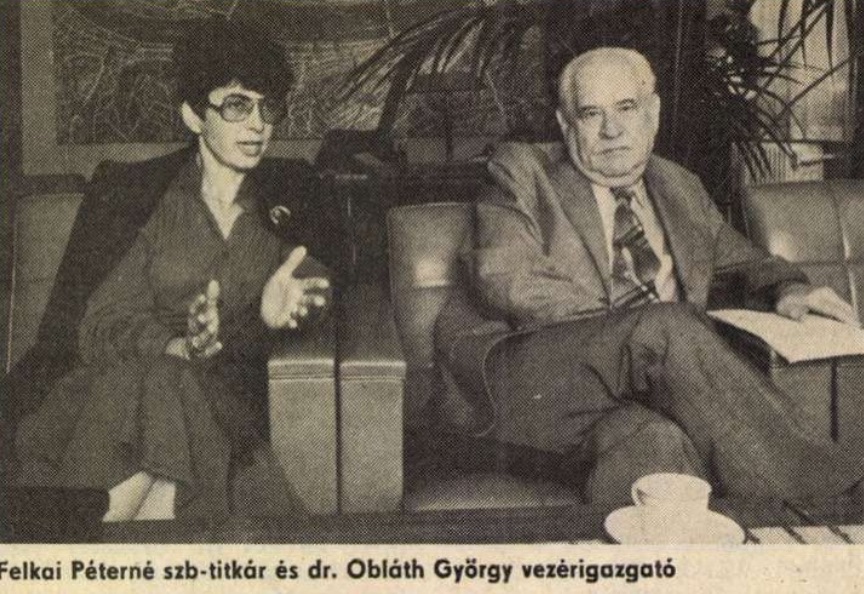
Source: arcanum.hu
Sándor Sebes took the money to the West in suitcases
American intelligence Sándor Sebes, , to be one of the central figures of Swiss communist activity. Sebe was already mentioned in an earlier part of the series, where we presented the company foundings of the "elite" that came home in 1944. Sebes was not personally involved in Swiss commercial transactions, regardless of this, he is named as the controller of Hungarian financial and banking operations, who made currency purchases.
He was responsible for the distribution and transportation of funds received from Hungarian-related businesses in Switzerland: he carried the subsidies in suitcases to the communist parties operating in Western countries. According to the report, Sebes sent money intended for the Italian Communist Party's campaign to Italy from Hungarian-owned bank accounts in Switzerland, but he was also the one who organized the financing of the costs related to the strikes directed by the French Communists.
According to the CIA, all of this was covered by the profits of deals conducted by Hungarian companies. The Americans obtained this information in 1949, when, within the framework of the three-year plan, the country had just liquidated the most serious war damages with a huge effort, and the payment of reparations placed a huge burden on society - but to finance the subversive activities of the Western "fraternal parties " even then, resources had to be provided.
Among the Hungarian "businessmen" in Switzerland, the CIA listed Béla Révai , whose task, according to their knowledge, was to acquire American dollars and manage the collected currency. His place of work was the Mobiliare Verkehrs Bank in Zurich, whose owners were Hungarian emigrants and specialized in financing deals conducted by domestic companies in the West.
Edgar Woog – the Swiss-German key figure of the network
When summarizing the role and activities of the Swiss "Hungarian mafia", the role of the local left-wing organizations with which János Nyerges and his network worked in cooperation must also be touched upon. The organization of the support of the Swiss party companies from Hungarian state money dates back to the years Nyerges spent there.
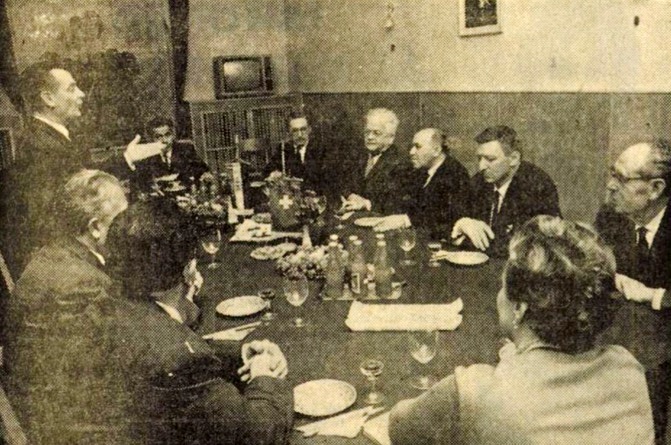
Edgar Woog's visit to Hungary. Unfortunately, it is not known which participant is the Swiss-German communist from the recording of the Fejér Megyei Hírlap
Edgar Woog , the leader of the Swiss-German communists, and his wife, Lydia Woog , founded the trading company Intra Handels AG in 1946, whose services had to be used for all trade deals between the Balkans and Western Europe. This kind of intermediary trade was the basis of the hidden financing mechanism of leftist movements, which the Soviets built in the period between the two world wars. In the free world, even the communist parties had the opportunity to do business, so they could found companies that rarely engaged in production. Instead, in return for a commission, they entered as a third party between the importer and the exporter, mediating during the exchange of goods, and their remuneration belonged to the communist party, which was the owner.
Hans Adam from Basel also made good money with the communist idea
Hans Adam , Contrax AG, was also interested in this relationship Among the Swiss party companies was Transmontan AG, which was founded with the aim of making it attractive for Western capital to participate in a Hungarian-Soviet mining company. Unfortunately, the US intelligence report does not go into detail about what industrial activities may be involved.
This data is certainly interesting and thought-provoking, as it indicates that a company was created in the Alps in parallel with the nationalization of the mines, which tried to attract Western capital into the industry. It is easy to imagine that the aforementioned mining company covers Maszovolt, Magyar-Soviet Nyersolaj Rt., since the company was founded in 1946 to drill oil wells in the Great Plain. Later on, we can learn from Nyerges's reports that Switzerland was interested in Hungarian oil shipments. Our country transported a considerable amount of oil to Europe via Masovo. According to the CIA, in 1948, approximately 125,000 tons of crude oil were planned to be exported from the Soviet zone - mainly from Russian and Romanian deposits - to the West, which was brokered by the Hungarian company, apparently with the aim of creating currency on behalf of the Soviets.
Switzerland and its banks therefore played a prominent role in the financing of international communist networks, but this is not surprising. However, it is perhaps not well known that Hungarian communists also played a role in the organization and management of this activity, and that a part of the sums handled by them most certainly came from our country. In other words, the much-talked about "rolling dollars" could really only have been fractions of the amount of money that was used by the Hungarian people to subvert the world during the decades of communism.
(to be continued)
Source: PestiSrácok
Author: historian Zsuzsanna Borvendég
Cover image: Anthony Anex (Keystone/Archive)

